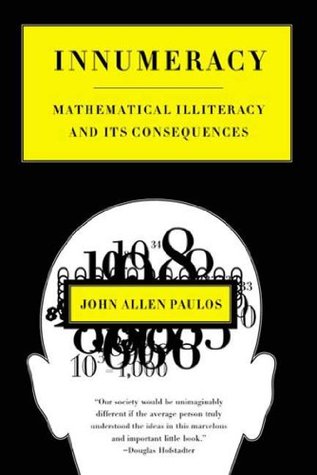More on this book
Kindle Notes & Highlights
Read between
September 21, 2020 - February 18, 2021
Preface to the 2001 Edition
Introduction
Even more ominous is the gap between scientists’ assessments of various risks and the popular perceptions of those risks, a gap that threatens eventually to lead either to unfounded and crippling anxieties or to impossible and economically paralyzing demands for risk-free guarantees.
1
Examples and Principles
BIG NUMBERS, SMALL PROBABILITIES
BLOOD, MOUNTAINS, AND BURGERS
GARGANTUAN NUMBERS AND THE FORBES 400
The book of Genesis says of the Flood that “… all the high hills that were under the whole heaven were covered…” Taken literally, this seems to indicate that there were 10,000 to 20,000 feet of water on the surface of the earth, equivalent to more than half a billion cubic miles of liquid! Since, according to biblical accounts, it rained for forty days and forty nights, or for only 960 hours, the rain must have fallen at a rate of at least fifteen feet per hour, certainly enough to sink any aircraft carrier, much less an ark with thousands of animals on board.
ARCHIMEDES AND PRACTICALLY INFINITE NUMBERS
THE MULTIPLICATION PRINCIPLE AND MOZART’S WALTZES
The so-called multiplication principle is deceptively simple and very important. It states that if some choice can be made in M different ways and some subsequent choice can be made in N different ways, then there are M × N different ways these choices can be made in succession.
TRIPLE-SCOOP CONES AND VON NEUMANN’S TRICK
JULIUS CAESAR AND YOU
It’s intriguing that we’re all, at least in this minimal sense, eventually part of one another.
2
Probability and Co...
This highlight has been truncated due to consecutive passage length restrictions.
SOME BIRTHDAY VS. A PARTICULAR BIRTHDAY
CHANCE ENCOUNTERS
A STOCK-MARKET SCAM
There is a strong general tendency to filter out the bad and the failed and to focus on the good and the successful. Casinos encourage this tendency by making sure that every quarter that’s won in a slot machine causes lights to blink and makes its own little tinkle in the metal tray. Seeing all the lights and hearing all the tinkles, it’s not hard to get the impression that everyone’s winning. Losses or failures are silent. The same applies to well-publicized stock-market killings vs. relatively invisible stock-market ruinations, and to the faith healer who takes credit for any accidental
...more
EXPECTED VALUES: FROM BLOOD TESTING TO CHUCK-A-LUCK
CHOOSING A SPOUSE
COINCIDENCE AND THE LAW
FAIR COINS AND LIFE’S WINNERS AND LOSERS
THE HOT HAND AND THE CLUTCH HITTER
3
Pseudoscience
Inspect every piece of pseudoscience and you will find a security blanket, a thumb to suck, a skirt to hold. What have we to offer in exchange? Uncertainty! Insecurity! —Isaac Asimov in the tenth-anniversary issue of The Skeptical Inquirer
INNUMERACY, FREUD, AND PSEUDOSCIENCE
One of Freud’s closest friends, a surgeon named Wilhelm Fliess, invented biorhythmic analysis, a practice based on the notion that various aspects of one’s life follow rigid periodic cycles which begin at birth. Fliess pointed out to Freud that 23 and 28, the periods for some metaphysical male and female principles respectively, had the special property that if you add and subtract appropriate multiples of them, you can attain any number. Stated a little differently: any number at all can be expressed as 23X + 28Y for suitable choices of X and Y. For example, 6 = (23 × 10) + (28 × –8). Freud
...more
Abstruse calculations, geometric forms and algebraic terms, unusual correlations—all have been used to adorn the silliest drivel.
PARAPSYCHOLOGY
PREDICTIVE DREAMS
LI’L OL’ ME AND THE STARS
John McGervey, a physicist at Case Western Reserve University, looked up the birth dates of more than 16,000 scientists listed in American Men of Science and 6,000 politicians listed in Who’s Who in American Politics and found the distribution of their signs was random, the signs uniformly distributed throughout the year. Bernard Silverman at Michigan State University obtained the records of 3,000 married couples in Michigan and found no correlation between their signs and astrologers’ predictions about compatible pairs of signs.
EXTRATERRESTRIAL LIFE, YES; VISITORS IN UFOS, NO
FRAUDULENT MEDICAL TREATMENTS
Most diseases or conditions (a) improve by themselves; (b) are self-limiting; or (c) even if fatal, seldom follow a strictly downward spiral.
If the patient improves, you take credit; if he remains stable, your treatment stopped his downward course. On the other hand, if the patient worsens, the dosage or intensity of the treatment was not great enough; if he dies, he delayed too long in coming to you.
Less controversial is the contention that there are no clear-cut, easy algorithms that allow us to distinguish science from pseudoscience in all cases. The boundary between them is too fuzzy.
CONDITIONAL PROBABILITY, BLACKJACK, AND DRUG TESTING
Unless the events A and B are independent, the probability of A is different from the probability of A given that B has occurred. What does this mean?
Imagine a man with three cards. One is black on both sides, one red on both sides, and one black on one side and red on the other. He drops the cards into a hat and asks you to pick one, but only to look at one side; let’s assume it’s red. The man notes that the card you picked couldn’t possibly be the card that was black on both sides, and therefore it must be one of the other two cards—the red-red card or the red-black card. He offers to bet you even money that it is the red-red card. Is this a fair bet? At first glance, it seems so. There are two cards it could be; he’s betting on one, and
...more
NUMEROLOGY
LOGIC AND PSEUDOSCIENCE
4
Whence Innumeracy?
A study indicates that whether or not a department has a mathematics or a statistics requirement is the most important single determinant of where a woman will attend graduate school to study political science.
REMEMBRANCE OF INNUMERACIES PAST


